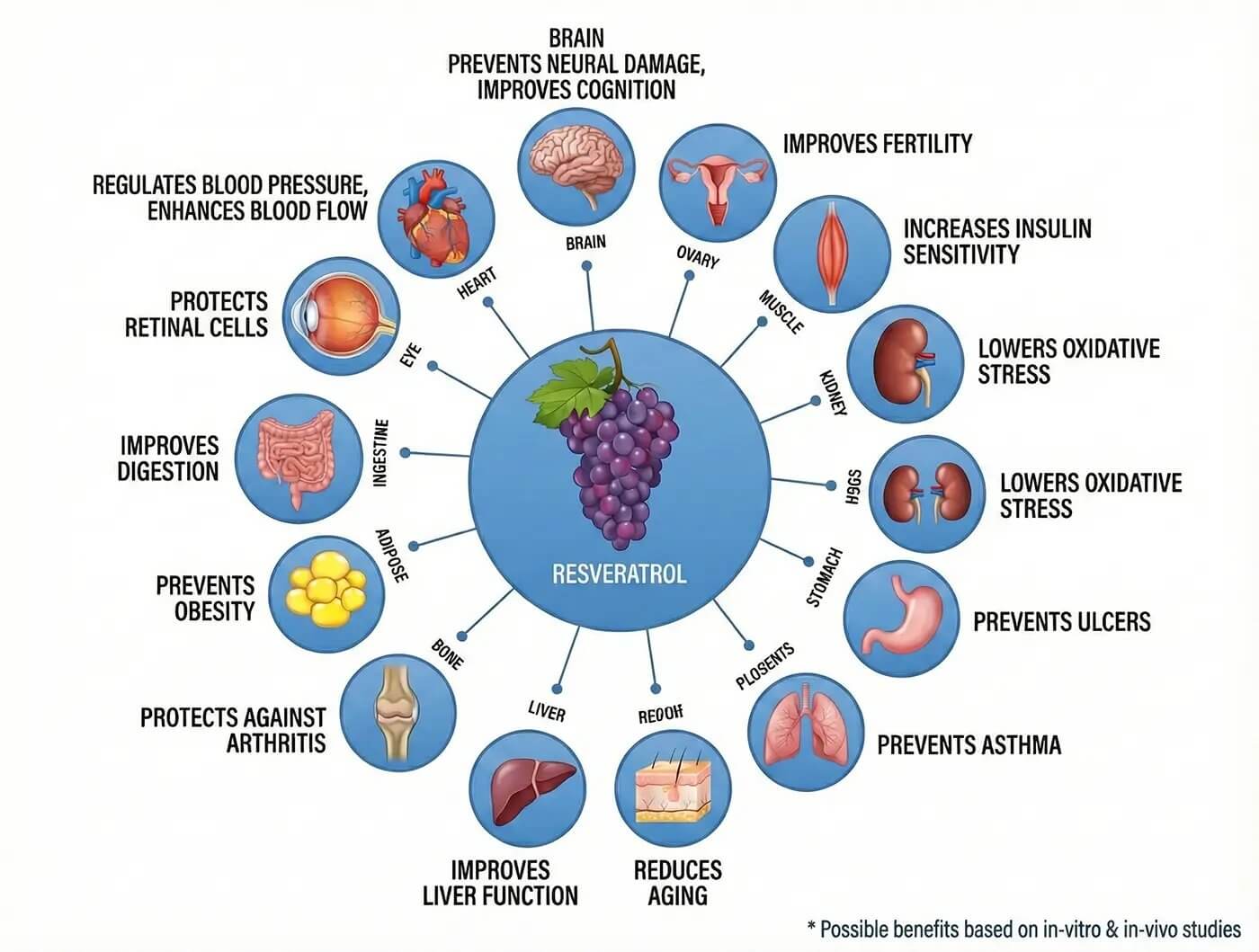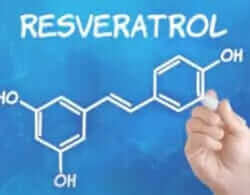Resveratrol and Your Immune System: Revolutionary Research Reveals Dual Benefits for Health Protection
Resveratrol stands out as one of nature's most versatile compounds, offering remarkable benefits that extend far beyond its reputation as an anti-aging supplement. This powerful polyphenol, found naturally in red grapes, berries, and peanuts, works as your body's multi-talented defender. Recent groundbreaking research reveals how resveratrol uniquely supports immune function through dual mechanisms that both enhance and regulate immune responses when needed.

Understanding Resveratrol's Protective Origins and Human Benefits
When plants face threats from infections or environmental stress, they produce resveratrol as their natural defense mechanism. Scientists classify this compound as a phytoalexin, essentially nature's own antimicrobial shield. What makes this discovery particularly exciting is that these same protective properties transfer directly to human health. Your body can harness resveratrol's defensive capabilities to strengthen immunity, fight inflammation, and protect against various health challenges.
The journey from plant protector to human health champion showcases resveratrol's remarkable versatility. While initially studied for its anti-cancer properties, cardiovascular benefits, and anti-aging effects, researchers now recognize its profound impact on immune system regulation. This natural compound offers hope for millions seeking safer, more effective ways to support their body's natural defenses.
Breakthrough Discovery: How Resveratrol Enhances Immune Response Against Infections
Austrian researchers recently published groundbreaking findings that challenge our understanding of how resveratrol interacts with immune cells. Their study, featured in Biochimica et Biophysica Acta General Subjects, reveals that resveratrol actually boosts certain immune functions, particularly those fighting bacterial infections.
The Science Behind Enhanced Immunity
In this carefully designed study, ten volunteers received 5 grams of resveratrol while researchers monitored key immune markers. The results were remarkable:
- TNF-alpha levels increased significantly in monocyte cells when exposed to bacteria
- Enhanced antibacterial properties emerged in immune cells
- Laboratory confirmation validated these effects using human cell lines
- Indirect benefits appeared for conditions like Alzheimer's and cancer prevention
These findings suggest that resveratrol doesn't simply suppress immune function as previously thought. Instead, it intelligently enhances specific immune responses when your body needs to fight infections. This selective enhancement represents a major breakthrough in understanding how natural compounds can support optimal health.

Revolutionary Research: Resveratrol's Role in Calming Overactive Immune Responses
While resveratrol enhances immunity against infections, it simultaneously demonstrates remarkable ability to calm overactive immune responses. A pivotal study published in PLOS ONE uncovered the molecular mechanisms behind this balancing act.
The Sirtuin Connection: Nature's Immune Regulator
Researchers discovered that resveratrol works through sirtuins, a family of proteins that act as molecular switches in your cells. This breakthrough finding explains how resveratrol can effectively manage inflammatory conditions:
- Sirtuin activation modulates T-cell activity
- Inflammatory responses decrease without compromising overall immunity
- Autoimmune conditions improve through targeted regulation
- Balance restoration occurs between immune activation and suppression
Promising Results for Arthritis and Autoimmune Conditions
The research team tested resveratrol's therapeutic potential using genetically modified mice with rheumatoid arthritis. After two months of resveratrol supplementation, the results exceeded expectations:
- Disease incidence dropped significantly
- Inflammatory markers decreased
- Joint health improved measurably
- No adverse effects occurred
These findings offer tremendous hope for individuals struggling with autoimmune conditions. Resveratrol's ability to selectively calm overactive immune responses while maintaining protective immunity represents a major advancement in natural health solutions.
The Dual Action Advantage: Why Resveratrol Stands Apart
What makes resveratrol truly exceptional is its intelligent dual action on the immune system. Unlike conventional medications that typically either suppress or stimulate immunity, resveratrol adapts to your body's needs:
| Immune Challenge | Resveratrol's Response | Health Benefit |
|---|---|---|
| Bacterial infection | Enhances TNF-alpha production | Stronger infection fighting |
| Autoimmune flare-up | Activates sirtuins to calm response | Reduced inflammation |
| Chronic inflammation | Modulates T-cell activity | Balanced immune function |
| Cancer risk | Supports healthy cell regulation | Enhanced protection |

Practical Applications: Harnessing Resveratrol for Optimal Health
Understanding how resveratrol works empowers you to make informed decisions about your health. This natural compound offers solutions for various health concerns:
For Enhanced Infection Protection
If you frequently battle colds, flu, or other infections, resveratrol supplementation may strengthen your body's natural defenses. The compound's ability to boost antibacterial immune responses provides an extra layer of protection during challenging seasons.
For Autoimmune Management
Those dealing with rheumatoid arthritis, lupus, or other autoimmune conditions may find relief through resveratrol's immune-modulating properties. By calming overactive immune responses without compromising overall protection, it offers a balanced approach to management.
For Healthy Aging
As we age, immune function naturally declines while inflammation often increases. Resveratrol addresses both concerns simultaneously, supporting robust immunity while keeping inflammatory processes in check. This dual benefit makes it particularly valuable for maintaining vitality throughout life.
Food Sources vs. Supplementation: Maximizing Resveratrol Benefits
While resveratrol occurs naturally in certain foods, achieving therapeutic levels through diet alone proves challenging. Consider these options:
Natural Food Sources
- Red grapes and red wine - Highest natural concentration
- Blueberries and cranberries - Moderate amounts with additional antioxidants
- Peanuts and pistachios - Good plant-based sources
- Dark chocolate - Contains small amounts alongside other beneficial compounds
Supplementation Advantages
Research studies typically use concentrated resveratrol supplements to achieve therapeutic effects. High-quality supplements offer:
- Standardized dosing for consistent results
- Enhanced bioavailability through advanced formulations
- Therapeutic concentrations difficult to achieve through diet
- Convenience without excess calories or alcohol
Future Horizons: Ongoing Research and Emerging Applications
The scientific community continues uncovering new applications for resveratrol's immune-modulating properties. Current research explores:
- COVID-19 and viral infections - Potential protective effects under investigation
- Cancer immunotherapy enhancement - Supporting conventional treatments
- Gut microbiome interactions - Impact on digestive immunity
- Neuroinflammation reduction - Brain health applications
Each new discovery reinforces resveratrol's position as a cornerstone of natural health optimization. The compound's ability to work with your body's natural systems rather than against them represents the future of preventive wellness.
Safety Considerations and Optimal Usage
While resveratrol demonstrates excellent safety profiles in research, responsible use ensures maximum benefits:
Dosage Guidelines
- General health maintenance: 250-500mg daily
- Therapeutic applications: 500-1000mg daily (consult healthcare provider)
- Research doses: Up to 5g used in studies under supervision
Best Practices for Supplementation
- Choose quality brands with third-party testing
- Take with meals to enhance absorption
- Start with lower doses and gradually increase
- Monitor your response and adjust accordingly
- Consult healthcare providers if taking medications
Conclusion: Embracing Resveratrol's Immune-Balancing Power
The latest research on resveratrol and immune function opens exciting possibilities for natural health optimization. This remarkable compound's ability to both enhance and regulate immune responses addresses a fundamental challenge in wellness: maintaining strong defenses while preventing harmful overreactions.
Whether you seek protection against infections, relief from autoimmune conditions, or simply want to support healthy aging, resveratrol offers scientifically validated benefits. Its dual-action mechanism represents nature's elegant solution to immune balance, providing hope and practical options for improving quality of life.
As research continues revealing new applications and mechanisms, one thing remains clear: resveratrol stands as a powerful ally in your journey toward optimal health. By understanding and harnessing its unique properties, you can take proactive steps toward a healthier, more vibrant future.
Frequently Asked Questions About Resveratrol and Immune Health
How does resveratrol support immune function differently from other supplements?
Resveratrol uniquely provides dual-action immune support by enhancing protective responses against infections while simultaneously calming overactive immunity in inflammatory conditions. Unlike single-action supplements that only boost or suppress immunity, resveratrol intelligently adapts to your body's specific needs through its interaction with sirtuins and immune cell regulation.
What is the best way to take resveratrol for immune benefits?
For optimal immune support, take resveratrol supplements with meals containing healthy fats to enhance absorption. Start with 250-500mg daily for general wellness, potentially increasing to 500-1000mg for specific health goals. Morning dosing often works best, allowing the compound to support your immune system throughout the day when you're most likely to encounter pathogens.
Can resveratrol help with autoimmune conditions?
Research shows promising results for resveratrol in managing autoimmune conditions like rheumatoid arthritis. By activating sirtuins and modulating T-cell activity, resveratrol helps calm overactive immune responses without compromising your body's ability to fight infections. Studies demonstrate significant reduction in disease activity and inflammatory markers with regular supplementation.
How long does it take to see immune benefits from resveratrol?
Individual responses vary, but many people notice improved energy and fewer infections within 4-6 weeks of consistent resveratrol supplementation. For autoimmune conditions, research suggests 2-3 months of regular use for meaningful improvements. The compound works by gradually optimizing cellular function, so patience and consistency yield the best results.
Is resveratrol safe to take with other immune supplements?
Resveratrol generally works well with other immune-supporting supplements like vitamin C, vitamin D, and zinc. Its unique mechanism complements rather than interferes with these nutrients. However, always consult your healthcare provider before combining supplements, especially if you take medications or have existing health conditions.
What makes resveratrol effective against both infections and inflammation?
The secret lies in resveratrol's ability to activate different pathways depending on your body's needs. When facing infections, it enhances TNF-alpha production in immune cells for stronger bacterial fighting. During inflammatory states, it activates sirtuins to calm excessive responses. This intelligent dual mechanism makes resveratrol uniquely valuable for comprehensive immune support.
Can I get enough resveratrol from food alone?
While foods like red grapes, berries, and peanuts contain resveratrol, achieving therapeutic levels through diet alone proves challenging. You would need to consume impractical amounts of these foods daily. Quality supplements provide standardized, concentrated doses that match those used in successful research studies, making them more practical for experiencing meaningful health benefits.
How does resveratrol compare to prescription immune medications?
Resveratrol offers a gentler, more balanced approach compared to prescription immunosuppressants or stimulants. While medications often powerfully push immunity in one direction, resveratrol works with your body's natural systems to optimize function. This makes it particularly valuable for long-term use and preventive health, though serious conditions still require medical supervision.
What age groups benefit most from resveratrol supplementation?
Adults of all ages can benefit from resveratrol's immune-supporting properties. Young adults appreciate its infection-fighting boost, middle-aged individuals value its anti-inflammatory effects, and older adults particularly benefit from its dual support of immunity and healthy aging. The compound's safety profile makes it suitable for long-term use across adult age groups.
Are there any side effects of taking resveratrol for immune health?
Resveratrol typically causes minimal side effects when taken at recommended doses. Some people may experience mild digestive changes initially, which usually resolve as your body adjusts. High doses might interact with blood-thinning medications. Starting with lower doses and gradually increasing helps ensure comfortable tolerance while maximizing immune benefits.
References:






